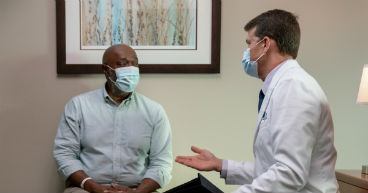
It’s fair to say that, generally speaking, men don’t have the best track record when it comes to seeing a doctor. In fact, they are half as likely as women to visit a doctor over a two-year period and more than three times as likely to skip seeing a physician for five or more years, according to survey data collected by the U.S. Centers for Disease Control and Prevention. Men are also more than twice as likely to say they’ve never had contact with a doctor or health professional as an adult.
The overall decrease in cancer screenings during the COVID-19 pandemic only compounded the issue, making it even more critical for men to understand the risks for developing prostate cancer and how to speak with their doctor about screening options.
One in eight American men will be diagnosed with prostate cancer, according to the Prostate Cancer Foundation, and African-American men are even more likely to be diagnosed than any other group. In fact, they are:
- 76 percent more likely to be diagnosed than white men
- Twice as likely to die as a result of prostate cancer than men of other ethnicities
- More likely than other groups to develop prostate cancer at age 40—a rarity among other ethnicities
Although the reasons for these disparities have not been clearly identified, it’s widely believed a combination of genetics, lifestyles, nutritional habits and the quality and frequency of medical care play a role.
Despite differences in risk and diagnosis, it’s important to remember prostate cancer is survivable, especially if caught early. Thanks to advanced screening methods, the five-year survival rate in the United States for men diagnosed with early-stage prostate cancer is greater than 99 percent.
The gold standard for prostate cancer screening is a simple blood test called a prostate specific antigen (PSA) test. PSA is a protein secreted only by the prostate and is easily measured in the blood. A PSA test is routinely performed during an annual physical exam, during which a doctor assesses the prostate for enlargement or abnormalities and checks the patient’s blood.
If the PSA level falls outside the normal range, additional testing may be required to determine whether the individual has prostate cancer. The PSA test is a useful tool in detecting cancer prior to the onset of symptoms and is a great example of how screenings can be true lifesavers.
Remember:
- The best time to check for, and treat, prostate cancer is when there are no symptoms.
- Prostate cancer patients typically have positive outcomes when the disease is detected early.
- Common symptoms include painful urination, blood in the urine or persistent pain or stiffness in the lower back, hips or upper thighs. If you’re experiencing any of these symptoms, it’s essential to be evaluated by a doctor as soon as possible.
Knowing your family history of prostate cancer also helps you manager your risk of developing the disease. Other potential risk factors include:
Poor diet and exercise: Obesity increases the risk of developing most cancers, so try to reduce the amount of fat you consume by eating less red meat and dairy products and eating more fruits and vegetables.
Cigarette and alcohol use: Smoking also increases the risk of developing many diseases and should be avoided altogether. Alcohol should be consumed in moderation, if at all.
Age: According to the American Cancer Society, 60 percent of all prostate cancers are diagnosed in men who are 65 and older, with an average age of 66. High-risk individuals and African-American men should get screened at age 40. All other men should start annual screening at 45.
Mental health and existing conditions: Seeking medical treatment for stress, high blood pressure, diabetes, high cholesterol and depression is an important step in helping you manage your overall health.
While it’s not accurate or even prudent to pronounce a patient “cured” or “cancer free” after medical care, the combination of treatment options available today portends a good long-term prognosis for men with early-stage prostate cancer.
If you have any of the noted risk factors, talk to your doctor about screening options as soon as possible. The key to prostate cancer survival is early detection.
Learn about radiation therapy and chemotherapy for prostate cancer.


